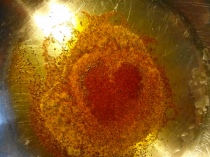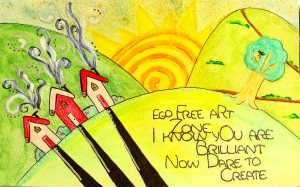 I used to think of intuition as that ah-ha moment, that gut feeling, that moment when I get a “supernatural” knowing, but I don’t think of intuition only in that context anymore. When I talk now about intuition I’m not talking about that occasional “hit” or ah-ha moment, or that occasional gut feeling of knowing, I am talking about living moment by moment, or life-living-knowing. I’m talking about the flow of energy, knowing. From an energy perspective, intuition is that flow of vibrational frequencies that are coming to us all the time, coming in, sourcing us with knowing. We are connected through energy, frequencies, in a greater, universal way. It is this continual connectedness to knowing, that we don’t trust or have cut off and have learned to not trust – feeling more in control or safer staying in our intellect. Intuition, I think, is living, trusting, and believing that knowing – that constant knowing.
I used to think of intuition as that ah-ha moment, that gut feeling, that moment when I get a “supernatural” knowing, but I don’t think of intuition only in that context anymore. When I talk now about intuition I’m not talking about that occasional “hit” or ah-ha moment, or that occasional gut feeling of knowing, I am talking about living moment by moment, or life-living-knowing. I’m talking about the flow of energy, knowing. From an energy perspective, intuition is that flow of vibrational frequencies that are coming to us all the time, coming in, sourcing us with knowing. We are connected through energy, frequencies, in a greater, universal way. It is this continual connectedness to knowing, that we don’t trust or have cut off and have learned to not trust – feeling more in control or safer staying in our intellect. Intuition, I think, is living, trusting, and believing that knowing – that constant knowing.
The concept of intuition has such varying perspectives and beliefs, some of which perhaps are so limiting at times, that I wanted to think-out-loud with you about them in this post. One of those beliefs is that, intuition is an occasional thing, a hit, as I mentioned before. I think intuition is more than that moment, I see it more as a flow. A second thing is that it comes to us, and I think it is always there for us, it is in us, we are always connected to a greater, more powerful knowing. I think we block it.
Recently, I talked to a cable/internet service electrician about my internet being so weak up in my bedroom. He said the reason it is weak is that it is the farthest distance away from the modem, but more so, the cause is that I have recessed lighting in my kitchen (which is below my bedroom). I thought that was kind of funny. He continued to explain that the frequencies from the lighting in the ceiling and the types of lights that they are, are confounding the signals and frequencies from the modem/internet getting to my bedroom. Hmmm. We talked about the possibilities that a booster or an extender (evidently they are two different things) might strengthen the signals and help to intercede with the problem.
In thinking about his explanation of the frequency issues with the lights, I thought in a way, that really is what happens with intuition as well. Intuition is that universal frequency, God frequency, Holy Spirit, Divine energy coming in and always being there and always having connection, source, knowledge at our avail – and yet so many things have gotten in the way of that connection.
Recess lighting, in the analogy, might be our attachment styles. How we learn to trust people. How we learn to trust ourselves with people. How we learn to trust our environment. How we learn to trust God. Furthering the complexity of frequencies, are our defense mechanisms, coping styles, ego states – all ways we learned/developed through relationships, attachments or lack of, (t)raumas [i.e. a child skinning his knee], (T)raumas [i.e. auto accident]. All of these carry different frequencies of energy (protective, combative, based in emotions, etc.) and they stand in the way of our connectedness to our intuition, our soul knowing – that connectedness to our higher Frequency.
Additionally I think as I mentioned before, perhaps our belief systems become other recessed lights; our culture; the times; the circumstances of our times; the things we listen to, the things we buy into, our dogma, all of those things…the cultural perception of us; our weight and height, our race, gender, beliefs, all of those things are the recessed lights that get in the way of our being receptive, not even being receptive, but having that frequency come in and be strong in us and through us, and in our being.
So when we start to realize there are all of these recessed lights; some we can change, some we can disconnect their power, some we can move or relocate, others we can put filters on so that they don’t directly affect the frequencies/flows that are coming in to us and through us. The connectedness we have to knowing is our intuition. It is not that intuition is a hit, but that given all of the interference, it comes to us as that ah-ha moment, like it is unique or supernatural, like it is something we have to wait for and capture with the chance of missing it. I think it is always there, at our avail. Our beings have learned to block it or disregard it out of protection or learned management in the world, but it is there.
I agree at times we get surges, those blatant knowing experiences. They are there, they, I think will always protectively be there for our good. More so than the surges is our coming to honor or soul – honor our intuition. How do we continue to recognize, normalize, validate, and learn to work with the recessed lights that are blocking us from the frequencies that are there for us?
Another way I described this concept of the avail of our intuition to someone one time was to say, we have all of these filters and we have to take and move as many filters as we can so that the frequencies can stay strong and pure. Perhaps the filters would be better understood as shields. And all of the things I talked about attachment styles, dogmas, emotions, relationships, experiences, trauma, all of those things are the shields that we use…and use is a good word, that we use to keep us from the purity of the frequency coming through. Because if we all really tapped into that frequency that is there for us, that is scary, unknown, powerful.
I think we do have those capabilities of being powerful, not in an authoritative way, not in a powerful way we know, but in a knowing way, powerful in our intuition in combination with our intellect, powerful in our energetic being, powerful in our really comprehending the circumstances of our universe, our community, our relationships, knowing what it feels like when I have judgment on others, knowing what that judgment feels like as the recipient, knowing what it feels like when I have anger or war feelings, knowing – knowing from a heart knowing, an intuitive knowing, that what I do unto others, I know what it feels like. That is the intuition about which I am talking.
That is the analogy perhaps that I wanted to share. I know that there are some who really say “yes” that is intuition, and there are some others that are in that wonderment stage. I think we can all grapple with this. I love the dialogue that has come forth in the comments from my previous blog and I continue to invite those comments, thoughts, contemplations, and grapplings, because it is in that, that we are all moving towards either moving the shields or relocating the recessed lights or taking the power out of them so that we don’t have the confounding frequencies. We have the avail of the Highest Frequencies all of the time, it is that which I think is intuition. Thought to integrate: perhaps if you are experiencing low signals, you might want to check your recessed lighting – smile.
 Thought I’d share a poem I recently wrote after a week of seeing, hearing, feeling, and knowing love. I interact with so many people who, whether spoken or unspoken, question love. I help some to see that “love gets in” when we begin to show that love to ourselves. But love is a community, it comes from within, it comes from above, it comes from the arms, neighbors, family, friends, and strangers around us and so this poem:
Thought I’d share a poem I recently wrote after a week of seeing, hearing, feeling, and knowing love. I interact with so many people who, whether spoken or unspoken, question love. I help some to see that “love gets in” when we begin to show that love to ourselves. But love is a community, it comes from within, it comes from above, it comes from the arms, neighbors, family, friends, and strangers around us and so this poem:






